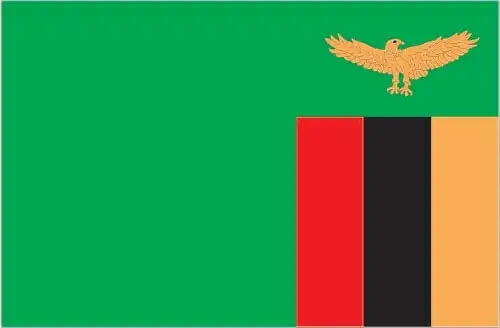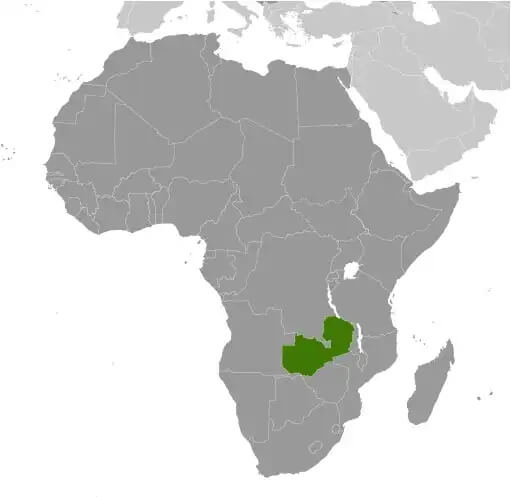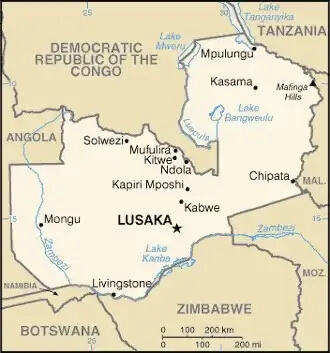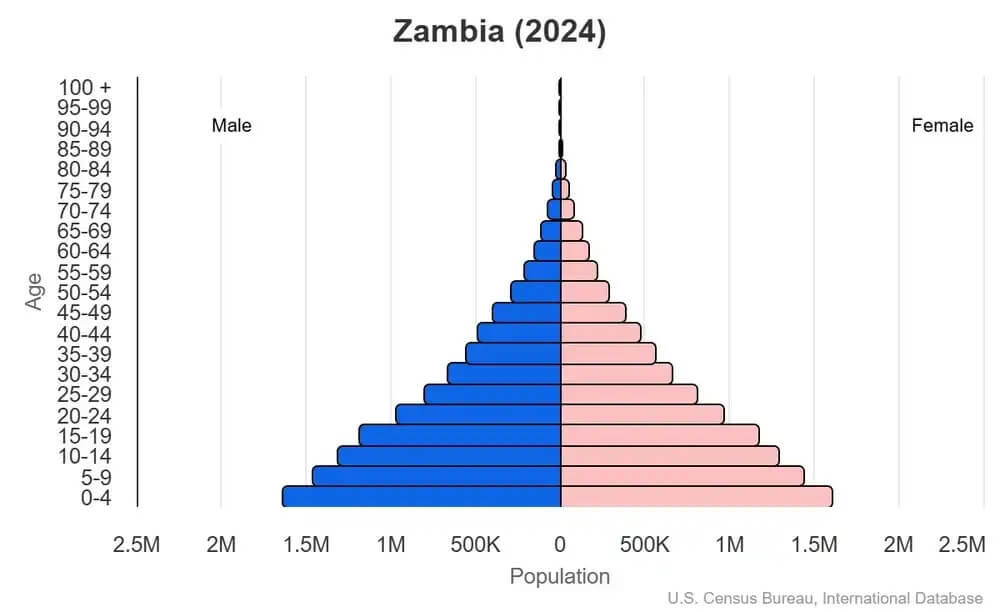World Book
Zambia
World Book Index
46


With a score of 46, the country is ranked 139th out of 158 countries in the World Book ranking. (more information)
Introduction
Multiple waves of Bantu-speaking groups moved into what is now Zambia over the past thousand years. In the 1880s, the British began securing mineral and other economic concessions from local leaders, and the territory eventually became a British colonial state known as Northern Rhodesia. The name was changed to Zambia upon independence in 1964.
Neighboring countries
Angola - Botswana - Democratic Republic of the Congo - Malawi - Mozambique - Namibia - Tanzania - Zimbabwe
Geography
Area
total: 752,618 sq km
land: 743,398 sq km
water: 9,220 sq km
Climate
tropical; modified by altitude; rainy season (October to April)
Natural resources
copper, cobalt, zinc, lead, coal, emeralds, gold, silver, uranium, hydropower
People and Society
Population
total: 20,799,116 (2024 est.)
Ethnic groups
Bemba 21%, Tonga 13.6%, Chewa 7.4%, Lozi 5.7%, Nsenga 5.3%, Tumbuka 4.4%, Ngoni 4%, Lala 3.1%, Kaonde 2.9%, Namwanga 2.8%, Lunda (north Western) 2.6%, Mambwe 2.5%, Luvale 2.2%, Lamba 2.1%, Ushi 1.9%, Lenje 1.6%, Bisa 1.6%, Mbunda 1.2%, other 13.8%, unspecified 0.4% (2010 est.)
Languages
Bemba 33.4%, Nyanja 14.7%, Tonga 11.4%, Lozi 5.5%, Chewa 4.5%, Nsenga 2.9%, Tumbuka 2.5%, Lunda (North Western) 1.9%, Kaonde 1.8%, Lala 1.8%, Lamba 1.8%, English (official) 1.7%, Luvale 1.5%, Mambwe 1.3%, Namwanga 1.2%, Lenje 1.1%, Bisa 1%, other 9.7%, unspecified 0.2% (2010 est.)
Religions
Protestant 75.3%, Roman Catholic 20.2%, other 2.7% (includes Muslim, Buddhist, Hindu, and Baha'i), none 1.8% (2010 est.)
Population growth rate
2.83% (2024 est.)
Government
Government type
presidential republic
Capital
name: Lusaka
Executive branch
chief of state: President Hakainde HICHILEMA (since 24 August 2021)
head of government: President Hakainde HICHILEMA (since 24 August 2021)
Diplomatic representation in the US
chief of mission: Ambassador Chibamba KANYAMA (since 30 June 2023)
Diplomatic representation from the US
chief of mission: Ambassador Michael C. GONZALES (since 16 September 2022)
Economy
Economic overview
lower-middle-income sub-Saharan economy; regional hydroelectricity producer; trade ties and infrastructure investments from China; IMF assistance to restructure debt burden; one of youngest and fastest-growing labor forces; systemic corruption; extreme rural poverty
Real GDP (purchasing power parity)
$79.207 billion (2024 est.)
$76.129 billion (2023 est.)
$72.251 billion (2022 est.)
Real GDP per capita
$3,700 (2024 est.)
$3,700 (2023 est.)
$3,600 (2022 est.)
Exports
$11.454 billion (2023 est.)
$12.444 billion (2022 est.)
$11.728 billion (2021 est.)
Exports - partners
Switzerland 27%, China 15%, India 13%, UAE 12%, DRC 10% (2023)
Exports - commodities
raw copper, refined copper, gold, precious stones, electricity (2023)
Imports
$10.854 billion (2023 est.)
$10.022 billion (2022 est.)
$7.691 billion (2021 est.)
Imports - partners
South Africa 25%, China 15%, UAE 10%, India 5%, Japan 5% (2023)
Imports - commodities
refined petroleum, fertilizers, trucks, sulphur, tractors (2023)
Human Development Index
The country's Human Development Index (HDI) is 0.595, ranking it 154th out of 193 countries tested. (more information)
World Happiness Report
The World Happiness Report ranked the country 151st out of 158 countries tested with a score of 3.421. (more information)



